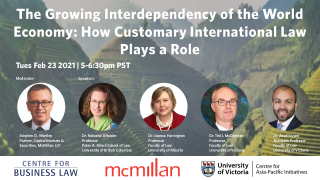
This panel will explore the origins of customary international law (CIL) as part of the law of Canada, the circumstances under which a nation can exert jurisdiction outside its territory and the impact of business and citizens of purported extraterritorial jurisdiction.
The past decade has witnessed an increase in attempts to regulate overseas conduct. In Nevsun, the majority of the Supreme Court of Canada re-affirmed that CIL is also the law of Canada and it must be treated with the same respect as any other law. CIL recognizes that there are limitations on jurisdiction over extraterritorial conduct. Under CIL, countries are limited in their assertion of jurisdiction to those cases where there can be established a substantial and genuine connection to the home jurisdiction. This limit is derived from duties of each country to respect the sovereignty of other countries.
While commentators have largely focused on the significance of Nevsun for transnational human rights litigation, it is worth contemplating the wider and deeper ripples in the legal landscape that this decision may yet produce. How might customary international law come into play when environmental accidents occur outside Canadian territory? What are the evolving expectations and responsibilities with respect to climate change in customary international law? Why might it matter that many UNDRIP provisions constitute customary international law? And what are the new demands on legal counsel tasked with advising clients in fast-moving transnational legal contexts where public and private international law are increasingly intermingled?
Webinar panelists will provide insights on:
- The practical implications of CIL on Canadian citizens and businesses
- How CIL can restrict the application of extraterritorial laws
- How Canadian businesses and individuals could be subject to torts based on international human rights violations and environmental incidents in Canadian courts
This event qualifies for 1.5 CPD credit.
Co-hosted by:

Speakers

Dr. Natasha Affolder |

Dr. Joanna Harrington |

Dr. Ted L McDorman |

Dr. Asad Kiyani
|
Moderator

Stephen D. Wortley
|
- Centre for Business Law
- General Public
- All Students
- Alumni
- Continuing Professional Development
- Faculty
- Graduate Students
- JD
- Staff
- Research Talks
- Student Events
